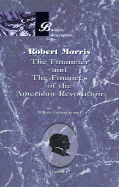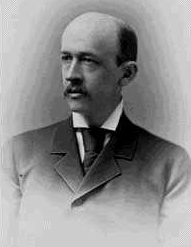
|
Robert Morris: The Financier and the Finances of the American Revolution
By William Graham Sumner
2000/03 - Beard Books
Volume I - 319 pp.
1893122972 - Paperback
US$34.95

|
Volume II - 340 pp.
1893122980 - Paperback
US $34.95
 |
|

|
A financial history of the American Revolution and one of the few books written on the subject. The work adds considerably to the body of knowledge known at the time it was first published.
Publisher Comments
Originally published in 1891, this two-volume work combines the biography of Robert Morris, the Philadelphia financier who became Superintendent of Finance during the American colonial period, with a financial history of the American Revolution. While not an exhaustive treatment of the subject, the book adds considerably to the body of knowledge known at the time it was written. A fascinating irony is that Robert Morris, the trustee of American finances, spent three years in prison near the end of his life for personal debts.

No book review available

William
Graham Sumner was born in Paterson, New Jersey on October 30, 1840. An American sociologist and political economist, he was schooled in Hartford's public school, entering Yale in 1859. Between 1863 and 1866 Sumner studied theology at Göttingen and at Oxford, before returning to Yale for almost three years as a classics tutor.
He was ordained an Episcopal minister and from 1872 was professor of political and social science at Yale. In economics he advocated a policy of extreme laissez-faire, strongly opposing any government measures that he thought interfered with the natural economics of trade.
In A History of American Currency (1874), his first book, Sumner focused on the money issue, then agitated by calls for the retirement of the Civil War "greenbacks" and later the establishment of a "bimetal" standard of gold and silver. Although he paid little attention to the demonetarization of silver in 1873 (a move critics later called the "Crime of '73) he was  distressed to see leading classical economists support international bimetallism, among them his Yale colleague Francis Amasa Walker. Holding his fire, he initially called only for a sound currency, but in 1878 finally attacked bimetallism publicly. distressed to see leading classical economists support international bimetallism, among them his Yale colleague Francis Amasa Walker. Holding his fire, he initially called only for a sound currency, but in 1878 finally attacked bimetallism publicly.
As a sociologist he did valuable work in charting the evolution of human customs—folkways and mores. He concluded that the power of these forces, developed in the course of human evolution, rendered useless any attempts at social reform. He also originated the concept of ethnocentrism, a term now commonly used, to designate attitudes of superiority about one’s own group in comparison with others. His major work was Folkways (1907).
In 1890 Sumner fell victim to what was termed a "nervous illness," the result of a punishing work schedule that had resulted in sixty articles and two books in the previous three years. Although he resumed his duties at Yale in the fall of 1892, the collapse took a permanent toll on his energies and output. Between 1876 and 1890, he had published some 108 articles and seven books. In the five years following his breakdown, he wrote "only" four articles and two books. Although in 1896 he added another dozen articles and a book, he averaged but two articles a year during the rest of his career.
Whatever his intellectual shortcomings, Sumner's hardheaded honesty and bold address of underlying issues has kept alive interest in his thought and career in recent decades.
He died in April 10, 1910.
 Other Beard Books by William G. Sumner Other Beard Books by William G. Sumner

| Volume I. |
| Chapter I. |
Morris's Father; His Birth; Marriage; Earliest Public
Activity |
1 |
| Chapter II. |
The Organization of the Treasury |
5 |
| Chapter III. |
Taxation until 1781 |
11 |
| Chapter IV. |
Paper Currencies; Price Conventions; Forced Circulation;
Specie in 1780; The Lottery |
35 |
| Chapter V. |
Commerce as an Engine of Coercion and commerce as a Means
of supply |
103 |
| Chapter VI. |
Embargoes |
132 |
| Chapter VII. |
Impressment |
141 |
| Chapter VIII. |
Supplies from Europe; History of the Missions there until
1781 |
156 |
| Chapter IX. |
1775-77: Morris in the Council of Safety, the Pennsylvania
Assembly, and the Continental Congress |
188 |
| Chapter X. |
1777-81: Morris in the Pennsylvania Assembly; Thomas
Morris; Silas Deane and Parties in Congress; the Ship
"Farmer;" the Committee of Philadelphia; the Fort Wilson Riot;
the Tender Laws of Pennsylvania |
209 |
| Chapter XI. |
Specific Supplies |
239 |
| Chapter XII. |
Bills on the Envoys until 1781 |
247 |
| Chapter XIII. |
The Situation in 1780; Morris becomes Financier, his Views
and those of Others about the Office |
258 |
| Chapter XIV. |
The Tasks of the Financier; his Means, Plans and Devices;
his Appeals to the states and Proposals to Congress |
277 |
| Chapter XV. |
Borrowing in Europe by the States; Appeals of Congress to
France; Mission of John Laurens; the Yorktown Campaign |
292 |
|
Volume II. |
| Chapter XVI. |
Loan by Spain; Attempt to Get Specie from Havana;
Remonstrances of France against undue Dependence on her; Jay's Distress;
Gillon and the Supplies from Holland; the End of 1781 |
1 |
| Chapter XVII. |
The Bank of Pennsylvania and the Bank of North America |
21 |
| Chapter XVIII. |
Exchange, Mint and Coinage |
36 |
| Chapter XIX. |
1782: Peremptory Refusal of Aid by France: Morris's
Discontent; Charges against him; Arthur Lee's Accounts; Morris Expected
to Default; the Loan of 1782 in Holland; State Borrowing; Contracts |
48 |
| Chapter XX. |
The Impost; Taxation until 1789 |
64 |
| Chapter XXI. |
Morris's Unpopularity in the Southern States; More
Heterogeneous Tasks; The Memorial of the Army Officers; the Overdraft of
January, 1783; More Appeals to France |
81 |
| Chapter XXII. |
Morris Resigns; Consents to continue in order to pay off
the Army; Issues Notes for that Purpose; Fault-finding with him; Last
Vain Appeals to France; the Loan in Holland; the Overdraft of 1784;
Morris quits Office; the Subsequent Organization of the Treasury |
94 |
| Chapter XXIII. |
Review and Summary of Morris's Administration; the Cost of
the War |
125 |
| Chapter XXIV. |
The Burden of the War upon the People |
135 |
| Chapter XXV. |
The Notes of Robert Morris |
149 |
| Chapter XXVI. |
Morris's Business Enterprises and Lawsuits, 1783-1793 |
162 |
| Chapter XXVII. |
The Bank War of 1785-1786 |
178 |
| Chapter XXVIII. |
The Commercial Convention and the Constitutional
Convention |
193 |
| Chapter XXIX. |
The Accounts of Robert Morris as Agent of the State of
Pennsylvania, as Superintendent of Finance, and with the Old Committee
of Commerce |
205 |
| Chapter XXX. |
Morris's Social Position and Relations |
221 |
| Chapter XXXI. |
Morris in the Senate of the United States |
230 |
| Chapter XXXII. |
The Federal Capital |
235 |
| Chapter XXXIII. |
Morris's Land Speculations |
251 |
| Chapter XXXIV. |
Was Robert Morris ever Rich? |
271 |
| Chapter XXXV. |
"Confidence has Furled her Banners, which no longer
wave over the Heads of M. and N." |
279 |
| Chapter XXXVI. |
Morris's Account of his Property; his Wife's Pension; his
Death; his Family; his Estate |
293 |
|
List of Authorities |
307 |
|
Index |
319 |
|
